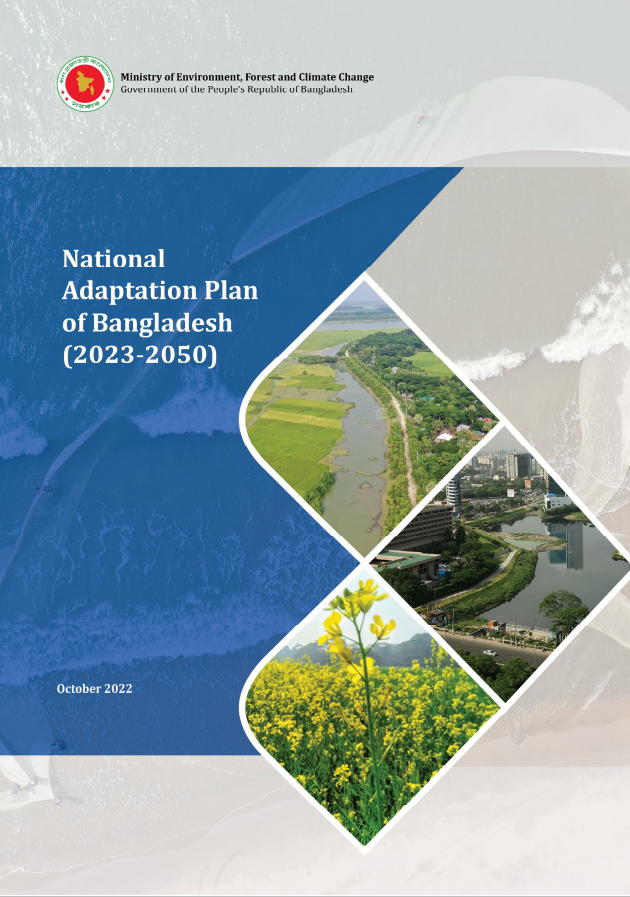🌿 COP 30 - Building a Greener Tomorrow
The 30th UN Climate Change Conference (COP 30) is taking place in Belém, Brazil. Stay informed about global climate actions, negotiations, and live sessions from 10 – 21 November 2025.
Get Updates
National Adaptation Plan of Bangladesh (2023‐2050)

Files
Date
January, 2024Author(s)
- Ministry of Environment, Forest and Climate Change, Government of the People's Republic of Bangladesh
Abstract
With an underlying objective of reducing risks and vulnerabilities to climate change impacts, the NAP envisions building a climate-resilient nation through effective adaptation strategies that foster a robust society and ecosystems and stimulate sustainable economic growth. Six national adaptation goals have been set to achieve this vision: Goal 1: Ensure protection against climate change variability and induced natural disasters; Goal 2: Develop climate-resilient agriculture for food, nutrition, and livelihood security; Goal 3: Develop climate-smart cities for improved urban environment and well-being; Goal 4: Promote nature-based solutions for conservation of forestry, biodiversity, and well-being of communities; Goal 5: Impart good governance through integration of adaptation into the planning process; and Goal 6: Ensure transformative capacity building and innovation for CCA. The NAP implementation will seek to realize these six goals through 23 broad-scale strategies and 28 outcomes encompassing diverse aspects of safeguarding against climate-induced disasters. It will develop climate-resilient agriculture, infrastructure and other socioeconomic sectors through implementing inclusive and ecosystem-based adaptation, improved governance, enhanced climate finance and transformative capacity-building, and innovation. The NAP considered 11 climate stress areas in devising 113 interventions based on developed adaptation pathways and sectoral adaptation requirements. These interventions are aligned with the global Sustainable Development Goals (SDGs) and 52 climate adaptation projects of the Bangladesh Delta Plan 2100 (BDP2100). They ensure the inclusion of women and people with diverse gender identities, the elderly, persons with disabilities, youth, ethnic communities and other socially disadvantaged groups throughout the NAP process. Recommended interventions are envisaged as being implemented in an integrated and coordinated manner through programmatic approaches instead of ad-hoc, project-based, short-term initiatives. This will increase the effectiveness of adaptation in advancing systems transitions while avoiding overlaps and/or misuse of investment and reducing maladaptation. Programme-based implementation will allow stakeholders the flexibility to select locally led adaptation actions from the 113 interventions and implement them based on local priorities.
Citation
Ministry of Environment, Forest and Climate Change, Government of the People's Republic of Bangladesh
Publisher
Ministry of Environment, Forest and Climate Change, Government of the People's Republic of Bangladesh
Rights Holder
Ministry of Environment, Forest and Climate Change, Government of the People's Republic of Bangladesh
URI
https://knowledgehub.pksf.org.bd/collections/WUNnNnlYalNORTMrUGoraUl1ekZUdz09
